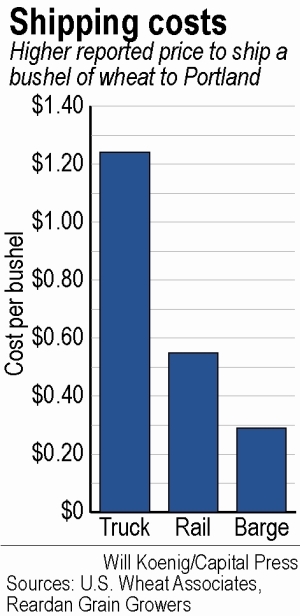forum
library
tutorial
contact

Barge Line Urges Shippers to Plan Ahead for Closure
by Matthew WeaverCapital Press, October 21, 2010
|
the film forum library tutorial contact |

|
Barge Line Urges Shippers to Plan Ahead for Closure
by Matthew WeaverCapital Press, October 21, 2010 |
Truck, rail operators prepare for surge in demand for service
 The linchpin of the Columbia-Snake transportation system is Tidewater Barge Lines, which expects to lose about 85 percent of its total revenue during the four-month river closure that starts Dec. 10, said assistant to the president John Pigott.
The linchpin of the Columbia-Snake transportation system is Tidewater Barge Lines, which expects to lose about 85 percent of its total revenue during the four-month river closure that starts Dec. 10, said assistant to the president John Pigott.
All of the company's business above The Dalles, Ore., will be cut off, they said. That includes petroleum headed upriver, solid waste from Clark County, Wash., going to the landfill in Boardman, Ore., and all container traffic.
"On the petroleum side, that's money that will just be lost, because people need energy when they need it," Pigott said. "It will come by trucks, by rail, by pipeline."
He said the price difference will depend on the market.
"That will be determined by the market once barging is off the table, what the next best way is to bring the product into Eastern Washington," Pigott said.
But the renovation absolutely needs to be done, Pigott said. The gates need to be replaced to avoid the potential of an unplanned, catastrophic failure.
"We're very thankful the funding is there to get it done, but it's still going to be an economic hardship for us," he said. "It's just one we understand is necessary."
Pigott said Tidewater is encouraging customers to schedule their loads early and let the company know what their needs are. While it's not for certain, he said, the market indicates additional amounts of grain will be moved prior to the closure.
"We only have a fixed amount of assets to do it with," he said. "Hopefully, with that amount of forewarning, we can ensure everybody gets the service they require.
"The cost-effectiveness of barging is simply we can push more tonnage with less power," Pigott said. "So our overall costs are kept as low as they can be."
Getting through the true cost of rail and barge comparison is more of an art than a science, Pigott said. Railroads can offer some discounts for one system and supplement it through a balancing of rates in other parts of the system, he said.
Railroads can also levy surcharges for cars, depending on how busy they are, Pigott said.
"Not only do you pay a tariff for the car, but you pay a surcharge as well," he said. "That is something that fluctuates."
Trucking is essentially an interim mode of transportation. Unless a grower is close to an elevator, trucking brings grain to rail or to the river, depending on where it originates.
"Truck is not a viable option for large-volume shipments," Pigott said.
Jeff Wilkie, vice president at R&I Trucking, Inc. in Davenport, Wash., said his company hasn't seen an increase in interest from agricultural customers, but he predicted a surge. His trucking company mostly delivers to the Lower Monumental area, he said.
Wilkie encourages farmers to use local businesses as much as possible, and press elevator management to use all freight systems possible.
"That way it's viable for everybody," he said.
Some customers are not used to ordering rail cars, said Suann Lundsberg, spokesperson for Burlington Northern Santa Fe Railway, and they must think about it. Burlington's car supply is sold out due to the large harvest size.
"If they need help getting walked through that process, we would be more than happy to talk to anyone," Lundsberg said.
"There's no longer car capacity available through us; they'll have to get them through the secondary market, which we don't control or operate." Lundsberg said the company surveyed all area shippers.
"The ones we heard back from, it doesn't sound like an unmanageable amount of traffic," she said.
Burlington Northern also surveyed short-line railroad companies, which spoke with potential customers not directly served by Burlington. The company is working with short lines to meet incremental demand, Lundsberg said.
learn more on topics covered in the film
see the video
read the script
learn the songs
discussion forum
